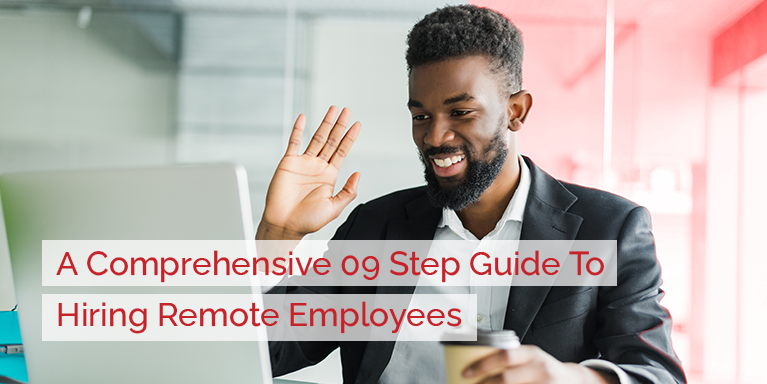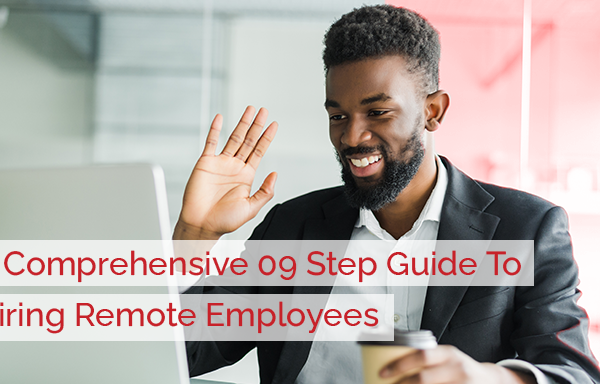
Do you have a job opening in your company but can’t find any suitable local candidates? In the internet era and with so many resources available around, why limit yourself to hiring locally?
Hiring remote employees can help you tap into the global talent and fill the vacant positions faster. However, hiring remote employees is easier said than done. We have listed a 09-step process to help you redesign your hiring process to source and start hiring remote employees.
Step 1: Prepare A Job Description
Preparing a comprehensive job-description enlisting the roles and responsibilities is the first step in hiring remote employees. Many hiring managers make the mistake of using generic job descriptions.
You must understand the role you are hiring for, involve your team, spend time, and create a job description that clearly explains the organization’s requirements.
Step 2: Specify The Candidate Persona
Once you’ve explicitly outlined the job-opening you are hiring for, the next step is defining the candidate persona. The candidate persona is the depiction of your perfect candidate. Take cues from the job description you created to draft your candidate persona.
To create an effective candidate persona, think about an ideal employee that will do justice to the organization’s expectations. An ideal employee has traits beyond work experience & education. Focus on interests, specific skills, and motivation levels while defining the candidate persona.
Step 3: The Employee Value Proposition
Clearly defining the employee value proposition goes a long way in hiring remote employees. It is the incentives and facilities offered by your organization to the employees in return for their work.
Moreover, you can also highlight specific perks like coverage for equipment or reimbursement for the employees’ home-office set up to make the proposition more appealing.
Step 4: Explain Your Organization’s Working
As important as this step is in hiring remote employees, it is also one of the most sidelined steps by the hiring managers. Ensure that you have a solid remote working plan before starting the hiring process. It’s important that you precisely define your organization’s rules & requirements for collaborating remotely.
For instance, you need to mention the time frame (if any) that the remote workers are expected to work in, irrespective of their time zone. Other requirements may include specifying the time the remote employees need to be available in Slack or Skype. Also, define your reporting structure. One of the most frequent complaints involving remote employees is lack of a proper reporting structure and confusion relating to who to report to and what regular reporting looks like.
The borderline: Having a set of rules for remote working will give the candidates an impression that your organization takes remote work seriously.
Step 5: Prepare A Job Advertisement
After doing all the groundwork, it’s time to draft the job ad. This where your marketing mind will come into play. Think of ways of luring candidates through your job ad. Sell your organization’s USPs and why working in it will be feasible for them.
You already have enough substance to draft an appealing job ad if you have followed the previous four steps. Keep the candidate’s expectations in mind so that they get a reason to apply.
Step 6: Test The Candidates
It is always advisable to test the candidates for their job suitability by including a few questions in the application form. You can also assign a short assignment that the candidate is required to submit along with their resume & cover letter.
Some candidates may abort the application process, but the ones that will submit the assignment will be the targeted ones. Ensure that the questions in the assignment match closely to the job opening.
Step 7: Interviews
We would suggest interviewing the candidate through video calls. Seeing the candidate explain their skills gives you a precise idea about their confidence levels and communication skills. Moreover, you can also throw a few challenging or tricky questions at them and notice how they respond to those questions in real-time.
You can leverage many live meeting software like Microsoft Teams, Google Meet, and Zoom Calls to get this done.
Follow the below steps:
- Prepare a list of all the important questions.
- Send meeting invites through any Online meeting software.
- Ask the same questions to all the candidates
- Shortlist candidates based on their responses.
Step 8: Verify References
Verifying the references is another crucial step while hiring remote employees. It is important to know the candidate’s background and if they haven’t faked anything in their resume. Hiring managers usually ignore this step, exposing the organization to possible negative outcomes in the future.
Contact the references provided by the candidates in the application form. Talk to them and pay attention to any signs of red flags. You can also outsource this work to a Recruitment Agency as they are experts in background verification.
Step 9: Closure
While hiring remote employees, it’s important to communicate throughout the process – even after you’ve closed the position. It’s your responsibility to inform other candidates that they didn’t make it because of so and so reasons. Your reasons can help them become better, and your brand’s reputation will also increase.
Final Word
Hiring remote employees isn’t easy. It takes proper planning, ground, and solid strategy to pull off a successful remote hiring process. Take cues from this article to ace your next remote hiring project.
If these tips seem overwhelming and you need to get the job done more effectively, you can also consider outsourcing it to a Recruitment Agency.
Happy Hiring!
SHARE ON
Contact Us
Successful Contractual Placements
in Finance Last Year (2020)
200+
Successful Recruitment in
Finance Last Year (2020)
247+




